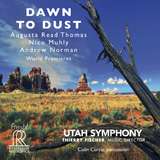|
Back
04/07/2016
“Dawn to Dust”
Augusta Read Thomas: EOS (Goddess of the Dawn)
Nico Muhly: Control
Andrew Norman: Switch
Colin Currie (percussion), Utah Symphony, Thierry Fischer (conductor)
Recording: Maurice Abravanel Hall, Salt Lake City, Utah (February, November, December 2015) – 69' 31
Reference Recordings FR-719 – Booklet in English

   
This excellent release presents three inviting, evocative new works commissioned and recorded to celebrate the 75th anniversary of the Utah Symphony. Each piece is a unique, virtuosic essay for the ensemble, and Thierry Fischer leads his players with confidence through a daunting program, captured in stunning sound.
Augusta Read Thomas’ EOS begins the program. Described as a “ballet for orchestra,” Debussy’s Jeux may spring to mind, but the sparse transparency of Thomas’ palette in EOS edges closer to a metallic Copland. Resonant percussion enhances a mostly heterophonic score evoking various facets of Greek mythology. Thomas fulfills her goal to create a score that is “always luminous,” and the clarity of her vision presents the orchestra in full exposure, with nowhere to hide. The depth of the Utah Symphony’s talents, vigorously organized by Thierry Fischer, are on fine display through the work.
Control, a five-movement homage to facets of the Utah landscape, achieves its extramusical goals with varying success. Composer Nico Muhly’s exhaustively descriptive program notes work too hard to tie musical gesture to inspiration. While the timbres of Thomas’ work clearly evoke a world of ethereal mythology, much of Muhly’s could as easily be associated with the Texas Gulf Coast as with Utah. Those familiar with Muhly’s rhetoric will find much to love, especially his penchant for Britten-esque layering of musical events over John Adams-esque rhythmic loops. This is especially apparent in the third movement, “Beehive”, where Muhly’s aim at evoking “productive busyness” does come across, but it never evolves beyond film-score level sonic imagery. Endings of movements are often abrupt, and this is true of the work’s final sonority, with its awkwardly dampened tubular bell stroke.
As in the Thomas, the orchestra’s handling of the work is exceptional. The oboe in the first movement (“Landform”) and trombone in the fourth (“Petroglyph & Tobacco”) play their solos with excellent tone and musicality. Fischer manages the de rigeuer rhythmic layering with ease and clarity.
The disc closes with the stunning Switch by Andrew Norman. Drama is inherent in a concerto—even more so in one for percussion and orchestra—and the piece abounds in dizzying gestures, dramatically and unexpectedly juxtaposed. The title alludes to the soloist’s ability to activate and deactivate the orchestra with his arsenal of instruments. The percussionists in the orchestra also have this power, which leads to an abundance of slapstick hits that result in instantaneous changes of tempo and gesture. This is “instrumental theatre” of the highest degree, and if the piece is this much fun to listen to on disc, one can only imagine the impression it makes in the concert hall.
Soloist Colin Currie has a heyday with the solo part, dashing off riffs on every drum, keyboard, and accessory percussion toy you can think of. His prowess spreads across the orchestra, who switch gears fearlessly as they negotiate Norman’s vertiginous labyrinth. Brass are gnarly, strings skitter—sometime ferociously, and woodwinds sing and wail with a panoply of expressive results. While the method behind the music of the Thomas and Muhly works is easy to envision, the extravagant notational mechanics necessary to produce Norman’s tour-de-force are difficult to fathom. Fortunately, those wanting to see how it’s all done can follow along with the score at Schott Music’s website.
This is essential listening for fans of new American orchestral music. The triptych gives a fascinating cross-section of current trends, and Reference Recordings’ “Fresh!” moniker is an incredibly accurate description of the results. The notes on the pieces are by the composers themselves, and it is interesting to see how the prose and musical writing mirror each other. Full personnel listing of the wonderful Utah Symphony is included. Recorded sound is demonstration quality. Highly recommended!
Marcus Karl Maroney
|